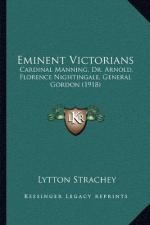|
This section contains 290 words (approx. 1 page at 400 words per page) |

|
Eminent Victorians Summary & Study Guide Description
Eminent Victorians Summary & Study Guide includes comprehensive information and analysis to help you understand the book. This study guide contains the following sections:
This detailed literature summary also contains Bibliography on Eminent Victorians by Lytton Strachey.
In Eminent Victorians (1918), Lytton Strachey examined the lives of four famous English individuals from the Victorian Era and found that they were not quite what previous biographies and popular legend had made them out to be. The four in question were Cardinal Manning, the leader of England's Roman Catholic community; Florence Nightingale, the nurse; Thomas Arnold, the educational reformer; and General Charles George Gordon, a soldier and adventurer.
Strachey sought a new approach to biography. The typical, sprawling two-volume Victorian biography presented its subject in the best possible light, ignoring any aspects of the life that might tarnish the person's achievements. Strachey determined that these large and tedious volumes, full of what he called "ill-digested masses of material," did a disservice to the art of biography. In contrast, he wrote short, pithy, artful biographies that told the truth about the subjects as Strachey understood it. The result, in Eminent Victorians, is a series of radical reinterpretations. Cardinal Manning is presented as a scheming, ambitious man rather than a pious representative of God. Florence Nightingale, although Strachey does not devalue her astonishing achievements, is presented as a woman maniacally obsessed with work, whose personality was acerbic rather than saintly. Strachey's Arnold, the headmaster of Rugby School, is little more than a pompous, pedantic fool. The portrait of Gordon is the most complex of the four, showing a man who was driven to his demise by the contradictions in his own personality and the vacillation of the British government.
Eminent Victorians is a landmark book not only because it punctured many of the pretensions and conceit of the Victorian Era, but because it signaled a new trend in the writing of biography, the influence of which is still discernible today.
Read more from the Study Guide
|
This section contains 290 words (approx. 1 page at 400 words per page) |

|



